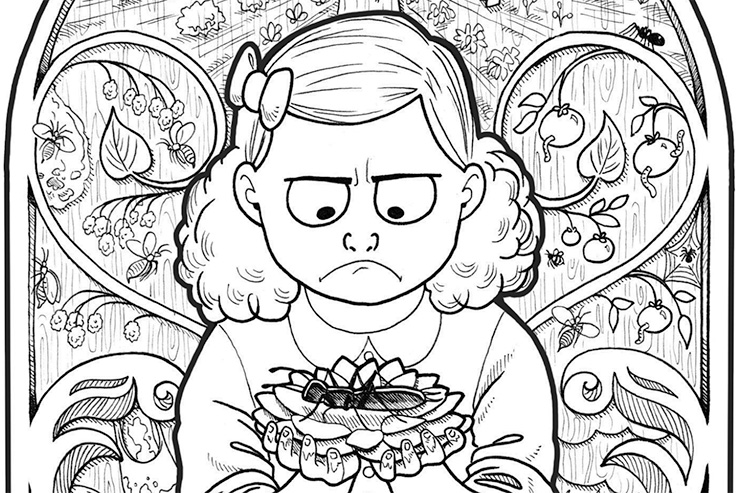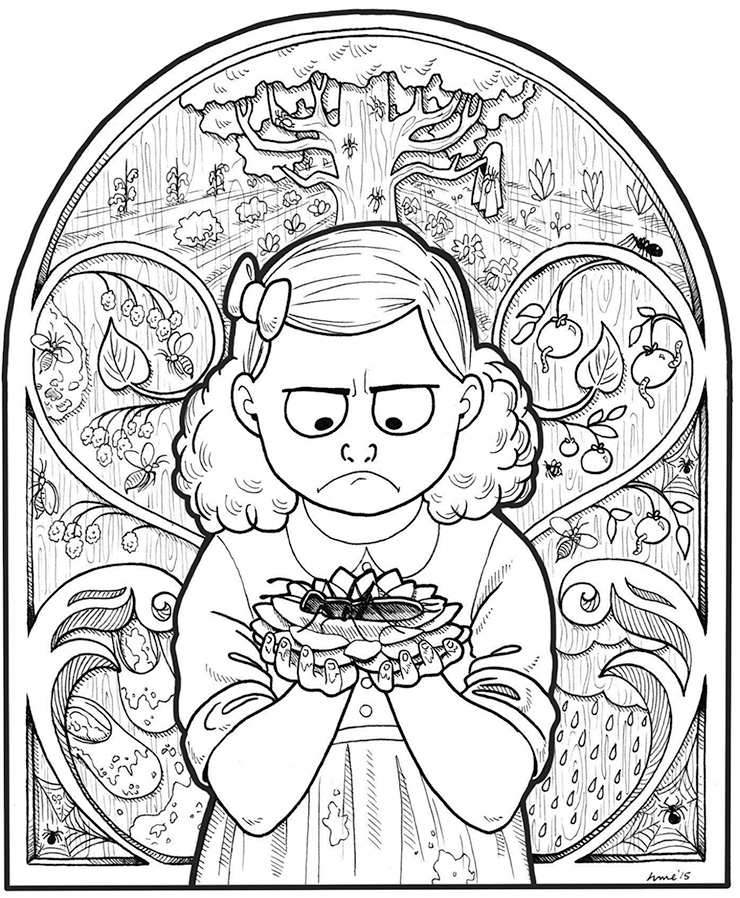
Some children might have sweet nostalgia of their parents working in the garden when they were young, which ultimately led to their love of gardening as an adult.
On the other hand, some might have actively avoided working in the garden like the plague. Maybe their parents made them weed too much, or they never grew to like vegetables or are allergic to flowers, and so they’re simply not interested. Fair.
My own mother was an avid gardener, though she didn’t bother me with any of the tasks. I remember her kneeling in front of the house-length garden bed that was on top of the hill our home sat on. She’d be planting, pulling weeds, and it didn’t look like fun to me, getting all sweaty and dirty. But she’d be out there for hours because she loved the peace, and I can now appreciate it myself, though I discovered it on my own path. And at least she didn’t garden me to death and gave me the chance!
Today’s story “Never” by Rita Traut Kabeto is about a little girl who grows up in post-war Germany and vows never to plant a garden after all the work her mother made her put in as a young girl. But as you can probably imagine, that story turned around eventually. Continue reading to learn how it unfolds.
If You Love Working in the Garden, You’ll Love These Stories
This story comes from our archive that spans over 30 years and includes more than 130 magazine issues of GreenPrints. Pieces like these that inject the joy of gardening into everyday life lessons always brighten up my day, and I hope it does for you as well. Enjoy!

Never
I promised myself when I was young.
By Rita Traut Kabeto

When I was young, in post-war Germany back in the 1950s, in the 1950s, I promised myself that I would never have a garden. Mother was to blame. She had a huge garden. Since she also worked in the family store, she eagerly drafted as many of us seven girls as she could for garden duty.
Our garden was the first one in a huge community garden. A concrete path led down the middle. To the left and the right of it stood apples, plums, pears, and sour cherry trees, along with countless currant and gooseberry bushes. Vegetable beds, raspberries, rhubarb, and a few flowers filled in the gaps.
And that was before our garden neighbor died, which made his garden available for a new owner. Mother didn’t waste anytime getting it!
On the right, a short path led to the garden house (my father had it built by a couple of employees who were trained carpenters). The little attic above its two rooms housed the tools. I remember a time when we had no garden house, only a large box on stilts to hold our tools. When it rained then, Mother got wet.
The garden house was a nice gift to Mother, but a source of resentment for us girls. Since it rains a lot in the region I came from, the ground was always wet and muddy. We had to wear gardening shoes, loose-fitting, decrepit things with dried mud crumbs inside that could never be completely removed. Their worn heels made walking difficult, so we could never run and play. There wasn’t much room to play, anyway: Trees with branches full of bugs (it seemed to us) were everywhere.
The garden shoes dragged mud into the garden house, so every weekend one of us four oldest girls had to wash the floor. We used a rag that we hung on the plum tree to dry. When we took it down a week later, earwigs fell out of it. Earwigs also fell out every time we opened the shutters on the garden house’s back window. Every German knows the story Balduin Baehlamm by Wilhelm Busch, about a young poet who was lying in the grass to think—and an earwig made its way into his ear. I was young! I believed it.
Spiders built webs in the window corners of the rooms, webs that filled up with dead bugs. When ripe fruit fell and turned to mush, bees and wasps feasted on them—so we didn’t dare walk barefoot.
Raspberries often had little tiny worms in them, so you had to check before you popped one into your mouth. Speaking of raspberries, our garden plot had no toilet, so when the urge hit, you had to dig holes among the raspberries and hope that no one was looking.
When all those fruits and vegetables ripened, we had to pick them, all of them, every last little current berry that we had left because it was so small. Buckets upon buckets of gooseberries, cherries, raspberries, plums, green beans, carrots, and more—all of it made its way into our kitchen, where we had to wash it, pit it, peel it, slice it, and can it.
The work made my fingers black and dirty-looking, especially around the fingernails. And that on a Saturday, when a girl wants to primp in preparation for Sunday!
Mother did not allow us to have boyfriends. Of course I had one anyway, a secret one. But every summer Saturday afternoon, Mother would make some of us go out with her to the garden. Not everyone had a telephone in those days. If I made a date and Mother suddenly drafted me for garden duty, it was real agony for me. I worried that my friend might interpret my no-show as a break-up.
We couldn’t even escape Mother’s gardening at home: She kept plants on every window sill. If I dared to throw away a sickly plant, she promptly pulled it out of the trash, put it back on the sill—and gave me a lecture!
No, I was never going to have a garden when I grew up.
Then I came to the United States and got married. It didn’t take me long to get tired of tasteless, store-bought tomatoes. So I went out and bought some plants.
I have been gardening ever since. ❖
By Rita Traut Kabeto, published originally in 2015, in GreenPrints Issue #103. Illustrated by Hannah England

Did this remind you of a similar story about working in the garden you’d like to share? Leave a comment below, I’d love to hear it.




This is a wonderful description of a life I would have died to have, with exception of the earwigs! I can remember at a very early age, going to the side yard and planting my own row of Chinese cabbage-we lived in Hawai’i back then and no one but me was driven to garden. After they grew to the picking stage, I harvested them and my beloved Daddy me walked around the neighborhood of Chinese, Japanese, Portuguese and more, and every Michihili was quickly bought up for a quarter each. I thought I was rich! Thank you for a wonderful story, even though you all really had a lot to do at a young age but it made better people out of us all!